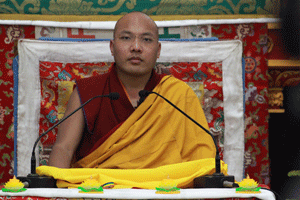23rd Feb –Vajra Vidhya Institute, Sarnath.
On the third day of his Spring Teachings the Gyalwang Karmapa began by reflecting on the sacredness of the teaching space, and it’s preciousness to him personally. Arising out of the vast vision of its Abbot, Khenchen Thrangu Rinpoche, Vajra Vidya Institute is nestled at the edge of Sarnath’s Deer Park, the sacred place where the Buddha Shakyamuni first turned the wheel of dharma. The towering Dhamek Stupa, constructed over a millennia ago to venerate the Buddha’s monumental act of teaching the dharma, is only a short walk away from where the Gyalwang Karmapa’s own teachings are taking place, in Vajra Vidya Institute’s temple. “When I come to this temple it’s like I have a special feeling that arises here,” he said. “Since the time I came to India, for the few small things that I have done in my life they’ve all started here, in this monastery’s temple. It’s like this place has been the starting point for everything that I have done.”
Returning once again to the theme of the previous day, the Gyalwang Karmapa continued his guidance on how to practice the dharma correctly, until we eventually reach a point where the dharma and our life have merged.
“To really practice the dharma we have to understand the reasons for the dharma, and we have to have full dedication and interest in the dharma. When we have that, only at that point are our dharma practice and the individual who is practicing the dharma no longer separate from each other. That is when the dharma, and the individual who is practicing it, become the same in flavor. That is the point when our dharma practice and this life become part of each other and they share the same nature.”
Moreover, as dharma practitioners we also need to truly understand and accept impermanence. We need to develop our ability to be relaxed and open to changes as they naturally occur, accepting situations as they arise around us. Likening the process of change to the natural and beautiful play of the four seasons, the Gyalwang Karmapa reminded those gathered that when things change they can be even better.
“When, because of external or internal circumstances there comes some sort of a change, we need to be able to go along with that change. So whatever happens, we go with the flow of events. If we are able to do this, then in our own mind we can be more relaxed. We can be more expansive. When we go along with that we can be comfortable, relaxed and spacious in our minds. If we are able to do this then we are able to be happy, and to have a comfortable and content life.”
The Gyalwang Karmapa then urged his students to uncomplicate their worlds, by keeping a simple outlook on life. Delivering profound guidance with skillful simplicity, he emphasized the importance of living grounded in the present moment, and of seeing the good that is already right in front of our eyes.
“The best thing is to be in the present. It’s better if we don’t have too high hopes for the past or the future situations. It’s better just to stay in the present. Whatever is right in front of our eyes, we need to be able to see the good in it. If we can see the good in it, then good things will be able to occur from that. I really feel that it helps to try to just have a simple outlook on life.”
The Gyalwang Karmapa ended the session by sharing one of his own personal strategies for dealing with problems when they arise. “When I have difficulties,” he said, “I feel like sometimes it’s good to just close the door, relax a little bit, let my mind be a little bit looser and more spacious. I feel that this is helpful, and this is probably something that will be helpful for you as well.”



